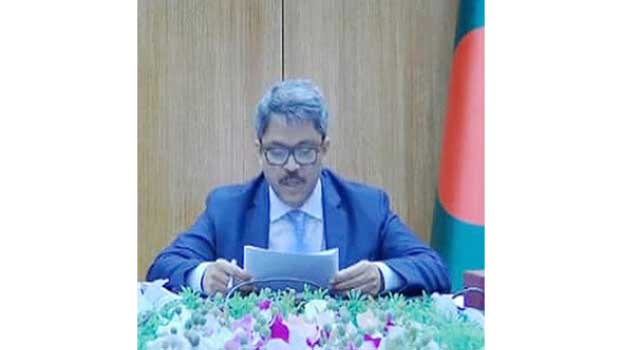Appeasement theory encourages Myanmar to flout int’l decisions

State Minister for Foreign Affairs Md Shahria Alam on Thursday said that the appeasement theory that is being pursued globally vis-a-vis Myanmar through increased bilateral trade, investment and development assistance “only encourages Myanmar to flout the decisions of international mechanisms and continue mass atrocities and repressive onslaughts on its very own population”.
“This is very frustrating that in the name of appeasement to Myanmar, unreasonable pressures are being mounted on Bangladesh threatening its sovereignty and security. The role of the United Nations in saving “humanity from hell” is also not visible in its policy actions towards Myanmar,” he said while speaking at the virtual conference on sustaining support for the Rohingya refugee response jointly organised by the US, UK, EU and the UNHCR.
He said unhindered humanitarian assistance is undoubtedly important for the sustenance of the displaced people. “However, helping the Rohingyas return to their home in Myanmar would be the real and most valuable service to this persecuted community. We look forward to firm commitments and concrete proposals for a durable solution from this event.”
The state minister said business as usual approach of the international community in relation to Myanmar is only emboldening Myanmar to maintain the status quo and inflict further atrocities on its minorities.
“For a durable solution to this Rohingya crisis, the culture of impunity in Myanmar must be stopped by vigorously pursuing accountability and justice through the international judicial mechanisms.”
Prime Minister Sheikh Hasina opened the border for a million Rohingyas back in August 2017 when these persecuted people of Myanmar were fleeing, en mass, from violence, persecution, atrocities and crimes against humanity at the hands of their own people in their own country.
Bangladesh was the first responder to have extended all kinds of humanitarian support to these 1.1 million Rohingyas providing space, food, safety, security and health facilities even before the humanitarian community stepped in.
The state minister said Bangladesh is not in a position to continue to take this burden any more.
“The Rohingyas must return to their country of origin as soon as possible. We must remember that they are here only on a temporary basis. The cost of hosting them on our society, security, resources, economy, environment and ecology is huge, immeasurable and in some cases irreversible. The situation is increasingly becoming untenable both for the Rohingyas and the host community,” he said.
He said the Rohingyas themselves want to return to their homeland at the earliest opportunity. The international community should sincerely work to create that opportunity for their return.
Under the bilateral agreement signed between Bangladesh and Myanmar, the repatriation was to commence in January 2018 and Myanmar committed to create a conducive environment for the repatriation of the Rohingyas.
“Despite our sincere efforts, the commencement of repatriation still remains highly uncertain due to a lack of decisive action on the part of Myanmar. Rather atrocities and violence continue in the Rakhine and Chin states together with Myanmar’s attempts to falsify, misrepresent facts, make unsubstantiated claims, and lay unjustifiable blame on Bangladesh to deny its own obligations and thereby misguide the international community. The world witnessed yet another round of such effort on the part of Myanmar during the 75th General Assembly of UNGA this year,” he said.
The state minister said lack of progress in repatriation in the last three years led to widespread frustrations and hopelessness among the Rohingyas.
Growing involvements of the Rohingyas in the camps in Cox’s Bazar in criminal activities and the recent episode of the perilous journey in the sea for better future elsewhere are clear manifestations of the mounting despair.
Further delay in repatriation may frustrate the displaced Rohingyas and entice them to fall in easy prey to human trafficking, radicalization, and other dangerous ventures. Peace and prosperity of the region hinges critically on the success in ensuring sustainable return and reintegration of all these displaced persons in their places of origin, he said.
The state minister said the international community has a responsibility to work with Myanmar to resolve the crisis and relieve Bangladesh from the burden that Myanmar has created.
“While we appreciate the humanitarian assistance of the international community, we also call upon them to engage with Myanmar in a meaningful way to ensure the creation of a conducive environment in the Rakhine.
“Till to date, there is no safety and security, no freedom of movement or livelihood options in the Rakhine state. Adequate international presence and humanitarian assistance in the place of return is crucial to support repatriation and reintegration. As you are aware Bangladesh has agreed to allow education for the Rohingya children through Myanmar curriculum in Myanmar language so that they could be easily reintegrated in the Myanmar society on their return. Similar education programme in Myanmar must be taken for Rohingyas so that after return they can be smoothly reintegrated in Myanmar society.”
He said during the past three UNGAs, the Prime Minister of Bangladesh has placed a number of concrete proposals.
“Had those been implemented, the crisis could have been resolved by this time,” he said.
“While the Rohingyas in the camps want to return to Myanmar, they are not confident that after return they would not be persecuted, that their basic rights would be guaranteed. This necessitated undertaking confidence-building measures involving ASEAN and other neighbouring countries as well as relevant UN Agencies (ASEAN++) whose civilian confidence-builders can undertake activities related to soft infrastructure projects, skill development, health, medical and education for Rohingyas in the Rakhine state.
“Such activities would make Rohingyas confident of their safety in Myanmar and encourage them to return,” he said, adding that Myanmar has a long history of persecuting and driving away its own people especially Rohingyas from the country in the pretext of security operations.
“This must end and be rejected. The culture of impunity has taken a deep root in Myanmar due to the country’s lack of willingness to bring the perpetrators to justice.”




